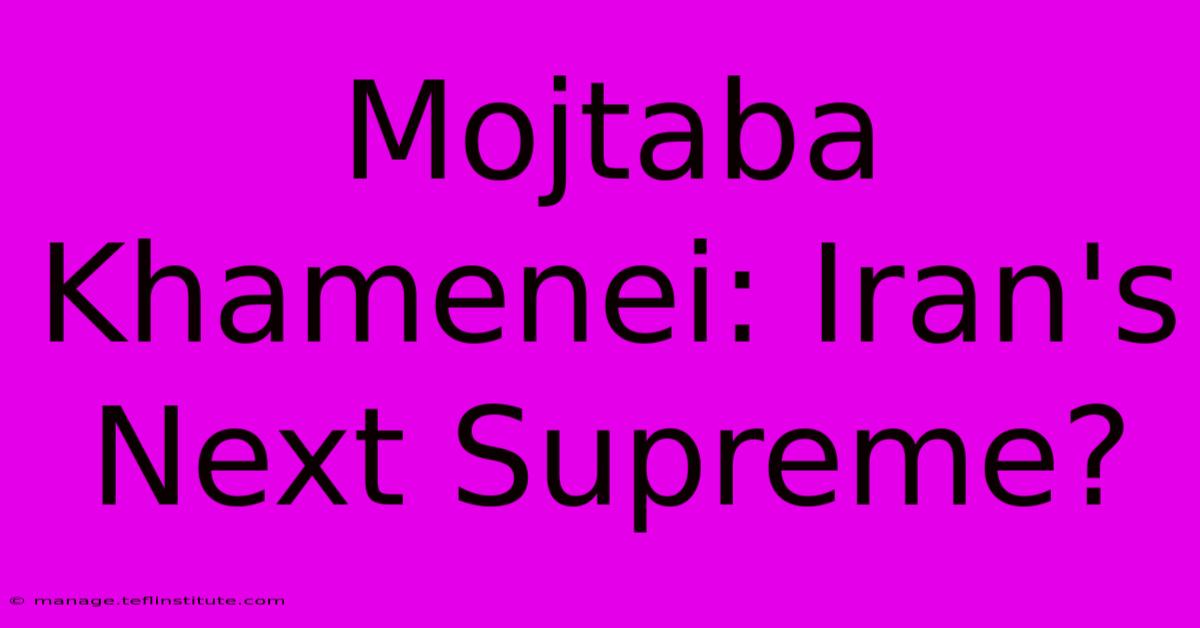Mojtaba Khamenei: Iran's Next Supreme?

Table of Contents
Mojtaba Khamenei: Iran's Next Supreme? The Uncertain Succession
The question of who will succeed Ayatollah Ali Khamenei as Supreme Leader of Iran is one of the most significant and closely watched issues in the region and beyond. While no clear successor has been publicly designated, the name most frequently discussed – and feared by some – is Mojtaba Khamenei, the Supreme Leader's son. His potential ascension, however, is far from assured and faces significant obstacles.
Mojtaba Khamenei, unlike his father, has not spent decades cultivating a public image as a religious scholar. He largely operates behind the scenes, holding no official government position. This lack of public profile fuels speculation, with some portraying him as a powerful figure wielding influence disproportionate to his official roles, while others dismiss his influence altogether. His supporters point to his close proximity to his father and his apparent role in advising on key decisions as evidence of his growing power.
Arguments for Mojtaba's Succession:
- Familial Ties: The most obvious argument rests on his relationship to the current Supreme Leader. In a system heavily reliant on established hierarchies and familial connections, his lineage gives him a substantial advantage. This precedence, although unwritten, has been observed in other instances within the Iranian political system.
- Growing Influence: Reports suggest Mojtaba Khamenei's influence is extending within the Iranian Revolutionary Guard Corps (IRGC) and other powerful institutions. His involvement in shaping policy and mediating disputes is frequently cited as evidence of this growing power. However, confirming these claims definitively is difficult due to the opacity of the Iranian political system.
- The Lack of a Clear Alternative: The absence of a widely accepted alternative candidate further strengthens Mojtaba's position. Other potential contenders lack either the necessary religious credentials, political clout, or the support of key factions within the establishment.
Arguments Against Mojtaba's Succession:
- Lack of Religious Authority: Unlike his father, Mojtaba Khamenei lacks the extensive scholarly background and religious authority typically associated with Supreme Leaders. This could prove to be a significant impediment to his ascension, as the position requires both political acumen and unquestionable religious legitimacy.
- Public Opposition: His lack of public profile also translates into a lack of public approval. Many Iranians are wary of a potential hereditary succession, viewing it as undermining the principles of the Islamic Republic. This potential for widespread dissent could destabilize the country.
- Internal Opposition: While reports of his growing influence are common, there is likely significant opposition within the Iranian political system. Powerful factions may resist his ascension, fearing his relatively inexperienced leadership and potential for consolidating power within his family.
- The System's Complexity: The selection process for the Supreme Leader is not explicitly defined. While the Assembly of Experts technically chooses the leader, the process is heavily influenced by behind-the-scenes power struggles and negotiations. Even with strong backing, Mojtaba faces numerous potential hurdles.
Conclusion:
The future of the Iranian Supreme Leader's office remains uncertain. While Mojtaba Khamenei’s proximity to power makes him a prominent contender, his succession is far from guaranteed. His lack of established religious credentials and public acceptance, combined with potential internal opposition, create a complex and unpredictable political landscape. Analyzing his potential ascension requires careful consideration of the competing factors at play, ranging from familial influence to the intricate dynamics within Iran's clerical and political establishment. The coming years will be crucial in determining whether he overcomes these challenges and becomes the next Supreme Leader of Iran, or if a different figure emerges to lead the Islamic Republic.

Thank you for visiting our website wich cover about Mojtaba Khamenei: Iran's Next Supreme?. We hope the information provided has been useful to you. Feel free to contact us if you have any questions or need further assistance. See you next time and dont miss to bookmark.
Featured Posts
-
Halsalls Tumultuous Love Life Explored
Nov 18, 2024
-
Glastonbury Faces Ticket Fury
Nov 18, 2024
-
I M A Celebrity Mc Guigans Story
Nov 18, 2024
-
I M A Celeb Urgent Announcement
Nov 18, 2024
Latest Posts
-
Coleen I M A Celeb Divorce Talk
Nov 18, 2024
-
Rooneys I M A Celeb Heartbreak
Nov 18, 2024
-
Coleen Rooneys Itv Divorce Decision
Nov 18, 2024
-
Coleen Rooneys I M A Celeb Reveal
Nov 18, 2024
-
Rooney On Divorce Itv Interview
Nov 18, 2024
-
I M A Celeb Coleens Heartbreak
Nov 18, 2024
